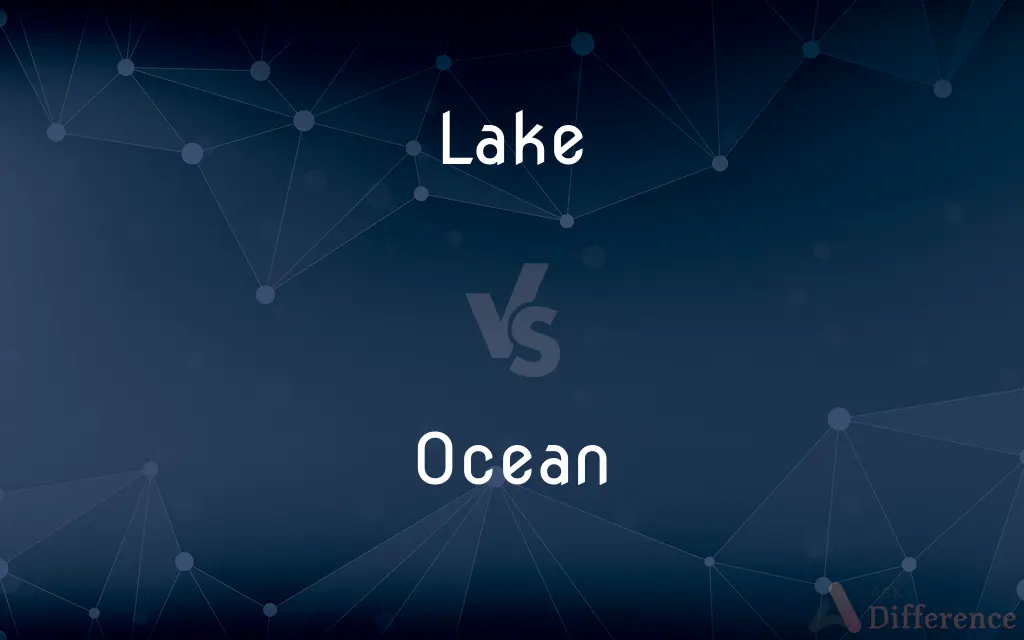Lake vs. Ocean — What's the Difference?
By Tayyaba Rehman & Urooj Arif — Updated on March 8, 2024
Lakes are enclosed bodies of freshwater or saline water, often inland, while oceans are vast saltwater bodies that cover much of Earth's surface.

Difference Between Lake and Ocean
Table of Contents
ADVERTISEMENT
Key Differences
Lakes are typically surrounded by land and can be freshwater, originating from rivers, glaciers, or rainwater, contributing to their diverse ecosystems. In contrast, oceans are continuous saltwater bodies that encompass about 71% of the Earth's surface, characterized by their depth, vastness, and marine biodiversity.
While lakes are generally smaller and can be found in various geographical locations, including mountains and plains, oceans are expansive and divide the Earth into different continents and regions. This size difference affects climate, weather patterns, and human activities, with oceans playing a crucial role in global climate regulation through currents and heat distribution.
The biodiversity in lakes varies widely, hosting freshwater fish, plants, and microorganisms, and their ecosystems are often isolated. Oceans, however, support a wide range of life, from microscopic plankton to the largest whales, with interconnected ecosystems spanning from coastal zones to the deep sea.
Human interaction with lakes and oceans also differs; lakes are often used for recreational activities, freshwater supply, and irrigation. Oceans are vital for global shipping, fisheries, and are a key source of food and economic activity for many coastal communities.
Despite their differences, both lakes and oceans face environmental challenges such as pollution, climate change, and overfishing, highlighting the importance of conservation efforts to preserve these vital water bodies and their ecosystems.
ADVERTISEMENT
Comparison Chart
Water Type
Freshwater or saline, depending on the source.
Saltwater, with a consistent salinity.
Location
Typically inland, surrounded by land.
Cover large areas, separating continents.
Size and Depth
Generally smaller and shallower than oceans.
Vast and deep, covering about 71% of Earth's surface.
Biodiversity
Supports freshwater flora and fauna, with isolated ecosystems.
High biodiversity, including many marine species and interconnected ecosystems.
Human Interaction
Used for recreation, drinking water, and irrigation.
Crucial for shipping, fishing, and coastal economies.
Compare with Definitions
Lake
An enclosed body of water, usually freshwater, surrounded by land.
The Great Lakes are a series of interconnected freshwater lakes primarily in the upper mid-east region of North America.
Ocean
A vast body of saltwater that covers about 71% of Earth's surface, divided into five major oceans.
The Pacific Ocean is the largest and deepest of the Earth's oceanic divisions.
Lake
Can vary in size, depth, and water composition (fresh or saline).
Crater Lake, formed in a dormant volcano, is known for its deep blue color and clarity.
Ocean
Features vast open waters, deep trenches, and diverse marine habitats.
The Mariana Trench, the deepest part of the world's oceans, reaches depths of over 36,000 feet.
Lake
Host diverse species adapted to freshwater environments.
Lake Baikal, the world's deepest and oldest freshwater lake, is home to thousands of species not found anywhere else.
Ocean
Support a wide range of life forms, from microscopic plankton to the largest marine mammals.
Coral reefs, often called rainforests of the sea, support some of the most diverse ecosystems on the planet.
Lake
Subject to issues like pollution, eutrophication, and habitat loss.
The Aral Sea, once the fourth-largest lake in the world, has been shrinking due to the diversion of rivers for irrigation.
Ocean
Integral for global climate regulation, shipping routes, and as a source of food and resources.
The Indian Ocean is a vital route for global commerce, carrying a significant portion of the world's maritime trade.
Lake
Often sources of freshwater for drinking, agriculture, and recreation.
Lake Victoria is crucial for the communities around it, providing water, food, and transportation routes.
Ocean
Faces threats from overfishing, plastic pollution, and climate change impacts like ocean acidification.
The Great Pacific Garbage Patch is a major environmental concern, highlighting the issue of oceanic plastic pollution.
Lake
A lake is an area filled with water, localized in a basin, surrounded by land, apart from any river or other outlet that serves to feed or drain the lake. Lakes lie on land and are not part of the ocean, although like the much larger oceans, they form part of Earth's water cycle.
Ocean
The ocean (also the sea or the world ocean) is the body of salt water which covers approximately 71% of the surface of the Earth and contains 97% of Earth's water. Another definition is "any of the large bodies of water into which the great ocean is divided".
Lake
A large area of water surrounded by land
Lake Victoria
Boys were swimming in the lake
Ocean
The entire body of salt water that covers more than 70 percent of the earth's surface.
Lake
An insoluble pigment made by combining a soluble organic dye and an insoluble mordant.
Ocean
Abbr. Oc. or O. Any of the principal divisions of the ocean, including the Atlantic, Pacific, Indian, Arctic, and Southern Oceans.
Lake
A large inland body of fresh water or salt water.
Ocean
A great expanse or amount
"that ocean of land which is Russia" (Henry A. Kissinger).
Lake
A scenic pond, as in a park.
Ocean
(countable) One of the large bodies of water separating the continents.
Lake
A large pool of liquid
A lake of spilled coffee on my desk.
Ocean
(uncountable) Water belonging to an ocean.
The island is surrounded by ocean
Lake
A pigment consisting of organic coloring matter with an inorganic, usually metallic base or carrier, used in dyes, inks, and paints.
Ocean
(figuratively) An immense expanse; any vast space or quantity without apparent limits.
The boundless ocean of eternity
An ocean of difference
Lake
A deep red.
Ocean
A blue colour, like that of the ocean (also called ocean blue).
Lake
A large, landlocked stretch of water or similar liquid.
Ocean
The whole body of salt water which covers more than three fifths of the surface of the globe; - called also the sea, or great sea.
Like the odor of brine from the oceanComes the thought of other years.
Lake
A large amount of liquid; as, a wine lake.
Ocean
One of the large bodies of water into which the great ocean is regarded as divided, as the Atlantic, Pacific, Indian, Arctic and Antarctic oceans.
Lake
A small stream of running water; a channel for water; a drain.
Ocean
An immense expanse; any vast space or quantity without apparent limits; as, the boundless ocean of eternity; an ocean of affairs.
You're gonna need an oceanOf calamine lotion.
Lake
(obsolete) A pit, or ditch.
Ocean
Of or pertaining to the main or great sea; as, the ocean waves; an ocean stream.
Lake
(obsolete) An offering, sacrifice, gift.
Ocean
A large body of water constituting a principal part of the hydrosphere
Lake
(dialectal) Play; sport; game; fun; glee.
Ocean
Anything apparently limitless in quantity or volume
Lake
(obsolete) A kind of fine, white linen.
Lake
In dyeing and painting, an often fugitive crimson or vermillion pigment derived from an organic colorant (cochineal or madder, for example) and an inorganic, generally metallic mordant.
Lake
In the composition of colors for use in products intended for human consumption, made by extending on a substratum of alumina, a salt prepared from one of the certified water-soluble straight colors.
The name of a lake prepared by extending the aluminum salt prepared from FD&C Blue No. 1 upon the substratum would be FD&C Blue No. 1--Aluminum Lake.
Lake
(obsolete) To present an offering.
Lake
To leap, jump, exert oneself, play.
Lake
To make lake-red.
Lake
A pigment formed by combining some coloring matter, usually by precipitation, with a metallic oxide or earth, esp. with aluminium hydrate; as, madder lake; Florentine lake; yellow lake, etc.
Lake
A kind of fine white linen, formerly in use.
Lake
A large body of water contained in a depression of the earth's surface, and supplied from the drainage of a more or less extended area.
Lake
To play; to sport.
Lake
A body of (usually fresh) water surrounded by land
Lake
A purplish red pigment prepared from lac or cochineal
Lake
Any of numerous bright translucent organic pigments
Common Curiosities
How do human activities affect lakes and oceans differently?
Human activities impact lakes and oceans through pollution, overuse, and climate change, but the scale and specific issues can vary due to the size, location, and nature of these water bodies.
What distinguishes a lake from a pond?
Lakes are generally larger and deeper than ponds, though there's no strict size rule separating them.
Are all life forms in the ocean saltwater adapted?
Yes, marine life has adapted to the saline conditions of the ocean, differing significantly from freshwater species.
Can lakes be saltwater?
Yes, some lakes are saltwater, often due to high evaporation rates in closed basins with no outlet.
Can lakes have tides like the ocean?
Very large lakes can have small tides, but they are much less significant than ocean tides due to the smaller volume of water.
How do oceans influence global climate?
Oceans regulate Earth's climate by storing and distributing solar energy, influencing weather patterns and temperatures globally.
Why are ocean ecosystems more diverse than lake ecosystems?
The vast size, varied habitats, and stable environment of oceans support a wider range of species and complex ecosystems compared to lakes.
Why is ocean water salty?
Ocean salinity results from the dissolution of rock minerals and salts, carried by rivers and streams to the seas over millennia.
What role do lakes play in the water cycle?
Lakes store freshwater and contribute to local hydrology through evaporation, supporting regional weather patterns.
What is the deepest point in the ocean?
The Mariana Trench is the deepest known point in the ocean, reaching over 36,000 feet below sea level.
How does water circulation differ in lakes and oceans?
Water circulation in lakes is primarily driven by wind and temperature changes, while ocean currents are influenced by wind, the Earth's rotation, and differences in water density.
What are the largest lakes and oceans on Earth?
The Caspian Sea is the largest lake, while the Pacific Ocean is the largest ocean.
Are there freshwater species in the ocean?
Some ocean regions, like estuaries, may host freshwater species, but most oceanic life is adapted to saltwater.
Can lakes disappear?
Yes, lakes can dry up due to natural processes or human activities, losing their water to evaporation or diversion.
Share Your Discovery

Previous Comparison
Interrogation vs. Question
Next Comparison
Laxative vs. DiureticAuthor Spotlight
Written by
Tayyaba RehmanTayyaba Rehman is a distinguished writer, currently serving as a primary contributor to askdifference.com. As a researcher in semantics and etymology, Tayyaba's passion for the complexity of languages and their distinctions has found a perfect home on the platform. Tayyaba delves into the intricacies of language, distinguishing between commonly confused words and phrases, thereby providing clarity for readers worldwide.
Co-written by
Urooj ArifUrooj is a skilled content writer at Ask Difference, known for her exceptional ability to simplify complex topics into engaging and informative content. With a passion for research and a flair for clear, concise writing, she consistently delivers articles that resonate with our diverse audience.
















































